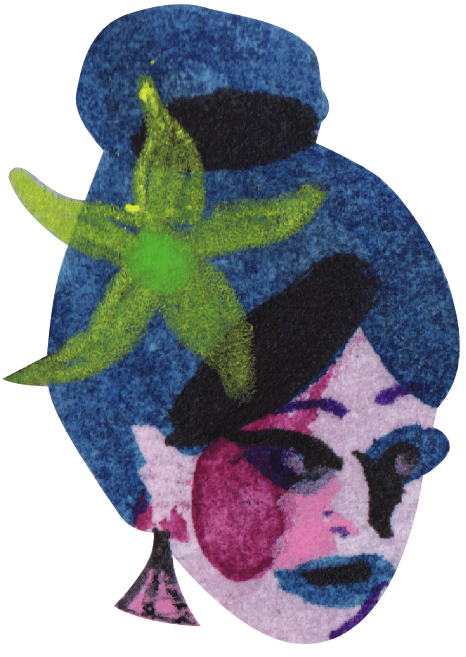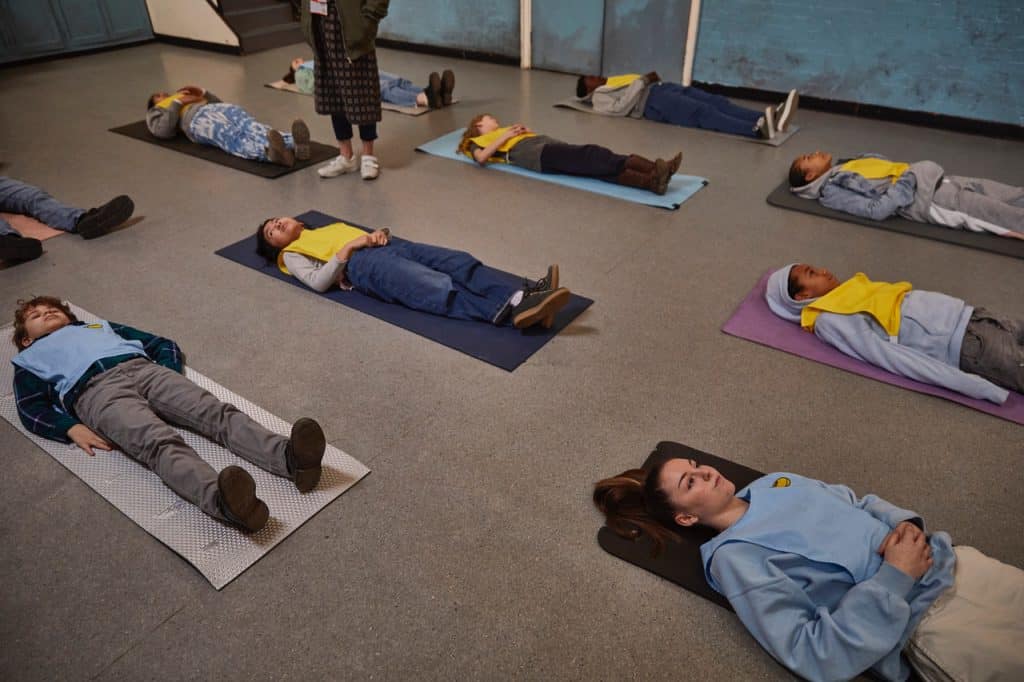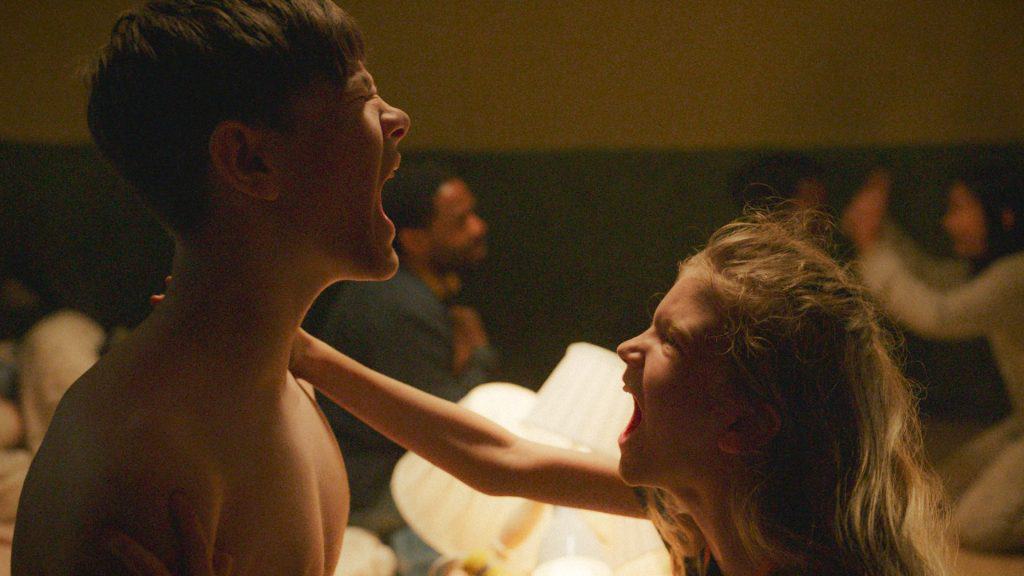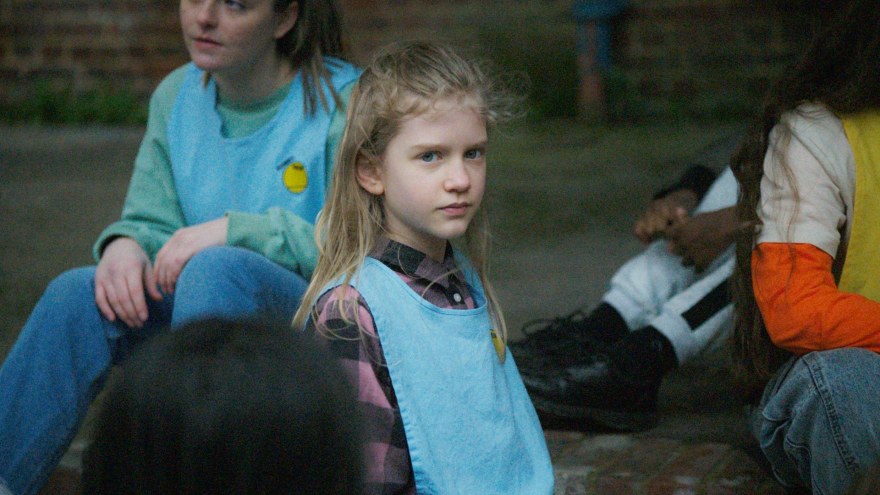Dîner avec Joy
Entretien avec Alexandra Brodski, réalisatrice de Joy
 Que vouliez-vous explorer à travers la relation entre ces deux personnages ?
Que vouliez-vous explorer à travers la relation entre ces deux personnages ?
Je voulais creuser la dynamique complexe des relations de pouvoir et de dépendance entre deux enfants incarcérés en centre fermé d’accueil. On suit l’adolescent Jacob qui, au regard de son âge et de son genre, serait censé être le personnage le plus fort, mais qui se soumet à la domination d’une petite fille, Joy. Je trouvais important que le pouvoir de Joy ait quelque chose de complexe et, en quelque sorte, d’inexplicable, afin que les spectateurs puissent s’identifier à Jacob qui, parce qu’il cherche à la comprendre, ne fait que tomber encore plus sous son charme.

Non. L’idée du personnage de Joy m’est venue après la lecture d’un article du New York Times sur les enfants-prêcheurs au Brésil. Notamment, une photo montrait une petite fille en train de prêcher des adultes profondément émus par ses paroles. La scène décrite m’a paru très étrange mais m’a incitée à explorer la manière dont on peut se soumettre à la volonté d’un être qui, à première vue, semble clairement moins puissant que nous ne le sommes.

L’article du New York Times décrivait le phénomène des enfants-prêcheurs comme spécifiquement ancré dans la culture brésilienne (et d’autres pays non-européens comme les États-Unis) des méga-églises. Quand avec ma co-scénariste Amelia Spencer et ma productrice Sabina Smitham nous avons commencé à développer le projet, on a décidé que nous ne voulions pas aborder ce thème comme un fait divers exotique, mais bien explorer dans quelles circonstances ce type de dynamique pouvait prendre place dans notre société. Il était significatif de situer l’histoire dans un milieu clos, parce que je pense que le rôle de la perte (ou de l’absence) de contact avec les gens et les lieux de la vie normale dans le développement d’une dépendance n’est pas négligeable. Plus on a fait de recherches sur les centres fermés, plus le cadre nous a semblé intéressant. On dirait qu’il déplace cette thématique des rapports de force complexes à un autre niveau : d’un côté, les gardiens adultes ont tout pouvoir sur les enfants incarcérés, d’un autre côté certains de ces enfants sont en prison pour avoir commis des crimes graves, ce qui donne aussi aux gardiens de bonnes raisons de rester prudents.


Nous n’avons pas tourné dans un centre opérationnel pour diverses raisons. Certaines étaient pragmatiques (restrictions sanitaires, difficultés d’obtenir des autorisations de tournage), mais c’était essentiellement une décision artistique. Je n’ai jamais vraiment eu l’intention de tourner dans un centre fermé, parce que le sujet du film n’était pas d’explorer les spécificités d’un tel endroit. Ce qui m’intéressait plus, c’était l’état émotionnel abstrait des enfants coincés dans ce genre d’institutions. Une autre raison de ne pas le faire était la liberté de créer l’univers du film avec la chef-décoratrice Ewa Galak et le directeur de la photographie Dan Atherton : nous avons passé beaucoup de temps à concevoir l’environnement et à développer les idées de couleur pour aboutir aux tabliers jaunes et bleus dont le rôle est crucial dans l’univers de cette prison où tout est séparé entre ce qui est bien (jaune) et mal (bleu).

Ça a été un long processus. Je crois qu’on a dû auditionner plus de 600 enfants au total. On s’apprêtait à entamer la pré-production, et on venait juste de rencontrer notre brillante directrice de casting Gemma Sykes, quand le monde s’est arrêté et qu’il nous a tous fallu entrer dans le premier confinement du coronavirus. Pour moi le casting, c’est une des choses les plus importantes dans la réalisation d’un film, surtout quand il s’agit d’enfants, je pense que 95 % de la direction d’acteurs consiste à trouver les bons. Honnêtement je n’aurais jamais pensé qu’un casting puisse fonctionner en visioconférence Zoom, mais ça a vraiment été le cas ! On a passé quelques mois à peaufiner la sélection via Zoom et à la fin nous avons invité un petit groupe d’enfants pour des rencontres en personne dans l’été 2020. Olivia Booth-Ford et Badger Skelton sortaient du lot dès le début, mais il était important pour moi de voir comment fonctionnait l’alchimie entre eux, et aussi l’aspect physique de leur interaction. Quand on les a rappelés une seconde fois, notre chorégraphe Jacob Holmes nous a rejoint et on a fait quelques exercices physiques ensemble (en préparation des ateliers suivants où nous allions développer le « langage » des séances de culte). Pour ce film en particulier, mais aussi en général, je pense que l’aspect physique du jeu d’acteurs est au moins aussi important que les dialogues, c’est pour ça que c’était formidable de voir les enfants en action.


J’ai vu le court-métrage génial d’Ernst de Geer, Kulturen au festival international Esthetica il y a quelques années, et ça m’a beaucoup rappelé le travail de Ruben Östlund. Les personnages étaient terriblement complexes et particuliers, et le film tellement honnête, et hilarant sans être d’un humour trop expansif et lourd. Je trouve que c’est une gageure d’arriver à créer des interprétations naturelles et poignantes sans jamais perdre de vue le sens d’un langage visuel précis, et le cinéaste y arrive tellement bien dans ce court !

Un bon film doit me toucher, émotionnellement ou intellectuellement, me surprendre, ou me faire rire. Un film vraiment bon fera tout ça à la fois.








